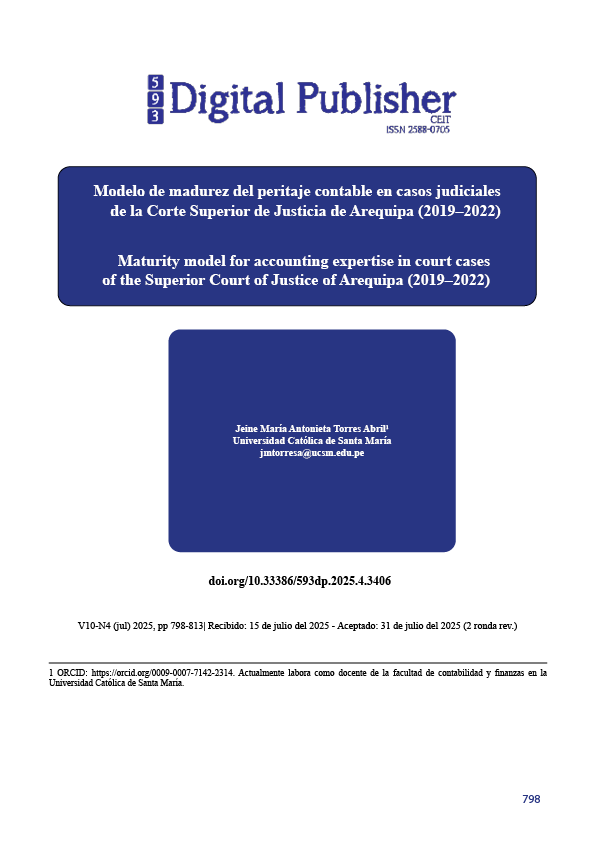Maturity model for accounting expertise in court cases of the Superior Court of Justice of Arequipa (2019–2022)
Main Article Content
Abstract
The jurisdictional bodies responsible for administering justice at the local level in Peru are a representative case of the deficient application of scientifically rigorous standards for expert reports, where their role is relevant and even decisive in a judicial process. To identify these deficiencies, this article aims to analyze the level of development and relevance of accounting expertise and its components: the expert, the expert report, and the assessment of expert evidence in the most frequent legal proceedings handled by the Superior Court of Justice of Arequipa between 2019 and 2022. To this end, 9 of 15 evaluation criteria proposed by an accounting maturity model developed by Vadizadeh were applied; the criteria were selected based on their compatibility with criminal, civil, and labor proceedings. The research methodology applies a qualitative approach and is characterized by being non-experimental and descriptive, employing a documentary review of legal regulations, scientific literature, and institutional reports. The findings corroborate the weak preparation of accounting experts in criminal proceedings in terms of scientific rigor and international standards. In civil and labor proceedings, more technical preparation and a higher degree of admissibility were observed. All of the aforementioned processes are carried out in an institution that has the potential to become uniform.
Downloads
Article Details

This work is licensed under a Creative Commons Attribution-NonCommercial-ShareAlike 4.0 International License.
1. Derechos de autor
Las obras que se publican en 593 Digital Publisher CEIT están sujetas a los siguientes términos:
1.1. 593 Digital Publisher CEIT, conserva los derechos patrimoniales (copyright) de las obras publicadas, favorece y permite la reutilización de las mismas bajo la licencia Licencia Creative Commons 4.0 de Reconocimiento-NoComercial-CompartirIgual 4.0, por lo cual se pueden copiar, usar, difundir, transmitir y exponer públicamente, siempre que:
1.1.a. Se cite la autoría y fuente original de su publicación (revista, editorial, URL).
1.1.b. No se usen para fines comerciales u onerosos.
1.1.c. Se mencione la existencia y especificaciones de esta licencia de uso.
References
Begazo Cardenas, A. G. (2025). La doctrina legal de la validez y fiabilidad de la prueba pericial establecida en el IX Pleno Jurisdiccional de las Salas Penales sobre la observación de las reglas de la ciencia para la valoración de la prueba pericial en las sentencias de los procesos j. https://repositorio.ucsm.edu.pe/items/44c98a5f-fae9-4b8e-98e9-7694ee918dc5
Caro Espitia, N., Hernández Aros, L., Gallego Cossio, L., y Flórez Guzmán, M. (2015). El dictamen pericial contable, medio de prueba y criterios de valoración. Diálogos de Saberes, 42, 91–102. https://doi.org/10.18041/0124-0021/DIALOGOS.42.190
Congreso de la República del Perú. (1959). Ley N° 13258: Ley de profesionalización del contador público. https://www.leyes.congreso.gob.pe/Documentos/Leyes/13253.pdf
Congreso de la República del Perú. (2009). Ley N.o 29497: Nueva Ley Procesal del Trabajo (NLPT). https://www.pj.gob.pe/wps/wcm/connect/bf9d4d0043eacd588837db829214c4f0/C.+LEGISLACION+Ley+No+29497+Nueva+Ley+Procesal+del+Trabajo.pdf?MOD=AJPERES
Consejo Ejecutivo del Poder Judicial del Perú. (1998). Resoluc. Administrativa N° 609-CME- PJ: Reglamento del Registro de Peritos Judiciales. Colegio de Ingenieros Del Perú. https://ciplima.org.pe/wp-content/uploads/2018/11/R_A-Numero-351-98-SE-TP-CME-PJ-_-Reglamento-Peritos.pdf
Cordero Abad, F. E., y Peña Aguirre, J. A. (2025). Informe pericial desde un enfoque normativo fundamentado en parámetros internacionales. Boletín ONBC. Revista Abogacía, 73, 16–37. http://ojs.onbc.cu
Corte Superior de Justicia de Arequipa. (2022). 25 AÑOS DE FUNCIONAMIENTO DE LA ODECMA AREQUIPA. Poder Judicial Del Perú,. https://csjarequipa.pj.gob.pe/main/25-anos-de-funcionamiento-de-la-odecma-arequipa/
Frisancho, G. M., Azevedo, R. R. de, Arroyo Morales, A., y Varela, P. S. (2025). Perceived legitimacy of accounting reform in Latin America: the accountants’ perspective. Journal of Public Budgeting, Accounting & Financial Management, 37(1), 48–69. https://doi.org/10.1108/JPBAFM-02-2024-0021
Green, M. D., y Sanders, J. (2015). Admissibility Versus Sufficiency: Controlling the Quality of Expert Witness Testimony in the United States. In Uncertain Causation in Tort Law (Vol. 1367, Issue 2010, pp. 203–239). https://doi.org/https://doi.org/10.1017/CBO9781316414774
Hernández-Sampieri, R., y Mendoza, C. (2020). Metodología de la investigación: las rutas cuantitativa, cualitativa y mixta.
Holiawati, H. (2019). Effect of Skills, Capabilities, Education and Training on Accounting Information System User Satisfaction. EAJ (Economic and Accounting Journal), 2(1), 35–41. https://doi.org/10.32493/eaj.v2i1.y2019.p35-41
Lesciotto, K. M., y Christensen, A. M. (2024). The over-citation of Daubert in forensic anthropology. Journal of Forensic Sciences, 69(1), 9–17. https://doi.org/https://doi.org/10.1111/1556-4029.15409
Llaque S, F., e Irvin, L. A. (2023). Contabilidad Tributaria. SUNAT. https://iat.sunat.gob.pe/sites/default/files/documentos/2023/09/archivos/contatrib.pdf
Ministerio Público de Perú. (2022). NCPP. Decreto Legislativo N° 957: Nuevo Código Procesal Penal. https://www.gob.pe/institucion/mpfn/informes-publicaciones/3034607-decreto-legislativo-n-957-nuevo-codigo-procesal-penal
Ochoa-Huarac, C. Y. (2025). El peritaje contable judicial y la determinación del perjuicio económico en las fiscalías provinciales anticorrupción. 593 Digital Publisher CEIT, 10(2), 644–658. https://doi.org/10.33386/593DP.2025.2.3100
Poder Ejecutivo Perú. (1992). CPC. Decreto Legislativo No 768: Código Procesal Civil. https://www.leyes.congreso.gob.pe/documentos/decretoslegislativos/00768.pdf
Poder Ejecutivo Perú. (2008). Decreto Legislativo N.° 1071. Ley que norma el Arbitraje. https://cdn.www.gob.pe/uploads/document/file/377449/DL-1071-ley-que-norma-el-arbitraje.pdf?v=1603162151
Poder judicial del Perú. (2019a). Ley N° 27584 - Ley que Regula el Proceso Contencioso Administrativo. https://busquedas.elperuano.pe/dispositivo/NL/1766381-1
Poder judicial del Perú. (2019b). Memoria Anual 2019 - Corte Superior de Justicia de Arequipa. In Memorias de Gestión. https://csjarequipa.pj.gob.pe/main/memorias2/memoria-anual-2019/
Poder judicial del Perú. (2019c). Resolución Administrativa N.o 300‑2019‑PRES‑CSJAR‑PJ. https://www.pj.gob.pe/wps/wcm/connect/f579d080499165bf9c1afea6217c40f1/RES-300-2019-PRES-CSJAR.pdf?MOD=AJPERES&CACHEID=f579d080499165bf9c1afea6217c40f1
Poder judicial del Perú. (2020). Resolución Administrativa N.o 000088‑2020‑PRES‑CSJAR‑PJ. https://www.pj.gob.pe/wps/wcm/connect/b0e5fa804d08ebbd8f47efe93f7fa794/RES+ADM+NRO.+088-2020-PRES-CSJAR-PJ.pdf?MOD=AJPERES&CACHEID=b0e5fa804d08ebbd8f47efe93f7fa794
Poder judicial del Perú. (2021a). Organos Jurisdiccionales - Corte Superior de Justicia de Arequipa. Poder Judicial Del Perú. https://csjarequipa.pj.gob.pe/main/organos-jurisdiccionales/
Poder judicial del Perú. (2021b). Resolución Administrativa N.o 000272‑2021‑P‑CSJAR‑PJ. In 2021. https://www.eje.pe/wps/wcm/connect/0189740042491e26851cbd5aa55ef1d3/RESOLUCION%2BADM%2B272-2021.pdf?CACHEID=0189740042491e26851cbd5aa55ef1d3&MOD=AJPERES&utm
Poder judicial del Perú. (2022a). Memoria Anual 2021-2022 - Corte Superior de Justicia de Arequipa. In Memorias de Gestión. https://csjarequipa.pj.gob.pe/main/memorias2/memoria-anual-2022/
Poder judicial del Perú. (2022b). RESOLUCION ADMINISTRATIVA N° 0001379-2022-P-CSJAR-PJ. https://www.ccpaqp.org.pe/documents/ComitesFuncionales_Integrantes/lista _repej_2022-2023.pdf?utm
Poder Judicial del Perú. (2010). LPT. Ley N° 26636: Ley Procesal del Trabajo. https://www.pj.gob.pe/wps/wcm/connect/f5d8cd8043eacd5487b4d7829214c4f0/Ley+No+26636+-+LEY+PROCESAL+DEL+TRABAJO.pdf?MOD=AJPERES
Poder Judicial del Perú. (2015). Acuerdo Plenario n°04-2015/CIJ-116: Criterios para la valoración de la prueba pericial en el proceso penal. Diario Oficial El Peruano. https://n9.cl/1b03
Porras-Aguirre, R. E. (2025). Desarrollo de capacidades para el debate pericial contable Developing skills for expert accounting debate. Digital Publisher CEIT, 1, 668–677. https://doi.org/doi.org/10.33386/593dp.2025.1.2833
Portal Estadístico del poder judicial. (2025). Estadísticas Jurisdiccionales ENE – MAR 2025 – Portal Estadístico. https://portalestadistico.pj.gob.pe/publicacion/estadisticas-jurisdiccionales-ene-mar-2025/
Rojas Huayta, W. G. (2019). Sistema de peritos contables con la nueva ley procesal de trabajo en la Corte Superior de Justicia de Arequipa [Universidad Nacional del Altiplano]. In Universidad Nacional del Altiplano. https://repositorioslatinoamericanos.uchile.cl/handle/2250/3279419
Torres Abril, J. M. (2021). Relación entre el peritaje contable y la admisibilidad de la prueba pericial en la corte superior del distrito judicial de Arequipa, 2019. https://repositorio.ucsm.edu.pe/items/393fa8b5-bc5e-4801-9790-97c2a1a5ca28
Tribunal Constitucional del Perú. (2021). Nuevo código procesal constitucional (LEY No 31307). https://www.tc.gob.pe/wp-content/uploads/2021/08/Nuevo-Codigo-Procesal-Constitucional.pdf
Vadizadeh, K. (2025). Presenting a Forensic Accounting Maturity Model at the Levels of Economic Enterprises , Judicial Processes , and the Government with a Focus on the Iranian Economy. 12(44), 207–243. https://doi.org/10.22034/ijfma.2025.78302.2234
Wex Definitions Team. (2022). Frye Standard | Wex | US Law | LII / Legal Information Institute. Legal Information Institute. https://www.law.cornell.edu/wex/frye_standard


